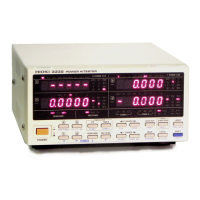54
────────────────────────────────────────────────────
4.9 Setting the Interface
────────────────────────────────────────────────────
ENTER
Moving on display c
▼
▲
etting value
ENTER
oving to setting item
▼
▲
Setting items
(2) Select the interface
During flashing on display a, press the ▲ or ▼ key to select.
The display for GP-IB, the address setting is displayed on display c.
The display for RS-232C, the settings of data length, parity, stop bit, and
communication mode on display d.
(3) Set the interface.
① GP-IB INTERFACE
1. During flashing on display a, move the flashing to display c (address or Pr
mode) by using the or key.
2. Change the settings with the ▲ or ▼ key. The address can be set between
0 and 30. The previous display of "0" or the next display of "30" is Pr.
(printer mode).
3. Press the
ENTER
key, and the flashing will stop and the setting will be
decided.
Unless this operation is done, the internal setting cannot be changed.
If the settings need to be changed again, press either the , ▲, ▼ keys
and the flashing points will reappear.
② RS-232C INTERFACE
1. Using the or key, move the flashing point to the setting item.
2. Select the flashing baud rate (1200, 2400, 4800, or 9600 bps) on display c
with the ▲ or ▼ key.
3. Select the flashing data length (7 or 8 bit) on display d with the ▲ or ▼
key.
4. Select the flashing parity (n :none/ o: odd/ E:even) on the 2nd character
from the left end) on display c with the ▲ or ▼ key.
5. Select the flashing stop bit (1 or 2 bit on the 3rd character from the left end)
on display d with the ▲ or ▼ key.
6. Using the ▲ or ▼ key, select the flashing communication mode (Pr.: print
mode/ Co.:control mode (character on the right)) on display d.
7. Press the
ENTER
key, and the flashing will stop and the setting will be
decided.
Unless this operation is done, the internal setting cannot be changed.
If the settings need to be changed again, press either the , , ▲, ▼ keys
and the flashing points will reappear.

